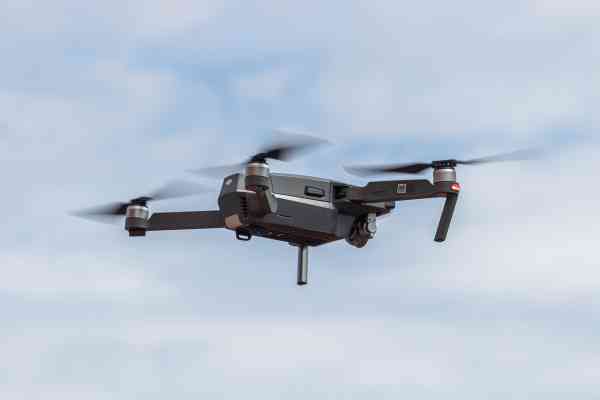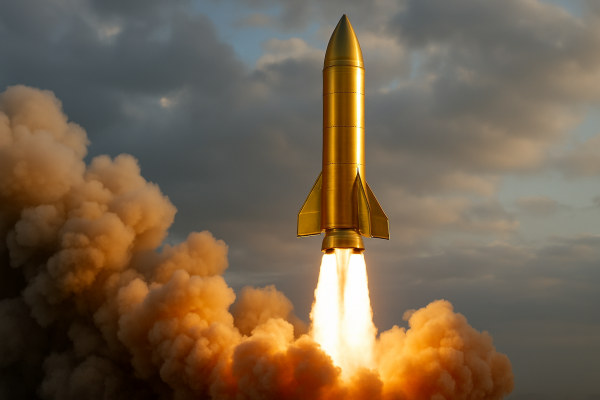October 9th, 2025 | 07:00 CEST
Almonty Industries' Raw material power brings Rheinmetall and Lockheed Martin into a new geopolitical era
Nations around the world are investing record sums in their defense capabilities. This defense boom is driving demand for critical raw materials to unprecedented heights. Suddenly, critical metals such as tungsten are at the center of global politics. They have become strategic commodities, with security of supply directly influencing military strength. This development is creating real momentum for companies covering the entire value chain, from mining to the defense industry to high-tech. Three stocks that perfectly embody this interplay between raw materials, production, and technology are Almonty Industries, Rheinmetall, and Lockheed Martin.
time to read: 5 minutes
|
Author:
Armin Schulz
ISIN:
ALMONTY INDUSTRIES INC. | CA0203987072 , RHEINMETALL AG | DE0007030009 , LOCKHEED MARTIN DL 1 | US5398301094
Table of contents:

"[...] China's dominance is one of the reasons why we are so heavily involved in the tungsten market. Here, around 85% of production is in Chinese hands. [...]" Dr. Thomas Gutschlag, CEO, Deutsche Rohstoff AG
Author
Armin Schulz
Born in Mönchengladbach, he studied business administration in the Netherlands. In the course of his studies he came into contact with the stock exchange for the first time. He has more than 25 years of experience in stock market business.
Tag cloud
Shares cloud
Almonty Industries – Strategic raw materials in the shadow of global politics
What at first glance sounds like a niche existence is currently turning out to be one of the hottest developments in the raw materials sector for investors. We are talking about tungsten. This extremely hard metal has become indispensable, whether in defense, aviation, or the manufacture of semiconductors. However, the supply situation is tense. For years, China has controlled more than 90% of the global market, a dependency that is increasingly worrying Western governments and companies. This strategic vulnerability opens up opportunities for producers outside China, such as Almonty Industries. The Company has systematically developed into a relevant tungsten producer in stable regions.
Its flagship is the revitalized Sangdong mine in South Korea, one of the highest-grade deposits in the world. The project, which once fell victim to cheap competition from China, is being rebuilt using state-of-the-art technology. Geopolitical developments have given this long-term strategy an unexpected boost and strengthened Almonty's position. The capital markets are rewarding this positioning. Almonty raised USD 90 million with its NASDAQ listing. The fresh capital will be used to bring the mine in South Korea fully into operation and finance the construction of its own refinery. This would elevate the Company to a fully integrated supplier, a truly unique selling point outside the Chinese sphere of influence.
The fundamental market situation is exciting. China recently ended its long-standing practice of indirectly subsidizing tungsten. This is fundamentally changing the price dynamics. Industry experts assume that the price level will stabilize in the medium term in a range of USD 450 to 550 per MTU, significantly above the historical level. It is the real production costs that now determine the price. At the same time, trade restrictions from Beijing are driving the West to build up its own capacities. It is a race for security of supply, with a focus on reducing market dependence on China. For investors, this tungsten story is therefore less a short-term speculation than a bet on the permanent restructuring of an entire supply chain. The stock has recently hit new all-time highs several times and is currently trading at USD 7.12.
Rheinmetall – A look at raw materials, e-mobility and defense
Critical raw materials such as tungsten, antimony, and rare earths are indispensable for Rheinmetall. They are used in high-tech components for defense systems and e-mobility. This dependence on a few producing countries, especially China, carries risks. The Company is addressing this challenge with strategic stockpiling, which is intended to secure production for years to come, and the diversification of its supply chains. This stockpiling and the search for alternative sources of supply are crucial to making production crisis-proof and ensuring a steady flow of products.
A recent series order from a US car manufacturer underscored the growing importance of the future market for electromobility. The circuit breaker business, with a volume of around EUR 60 million, shows how Rheinmetall is leveraging its technological expertise beyond the defense sector. These components are critical to safety, as they reliably switch the high-voltage system in vehicles. The Company's scalable solution impresses with its low weight, high efficiency, and durability. These factors also bring cost advantages in electric mobility.
At the same time, the traditional defense business is running at full speed. A major EUR 444 million order for artillery ammunition from an Eastern European customer underscores the ongoing strong demand. Rheinmetall is one of the largest producers of large-caliber ammunition and is pushing ahead with capacity expansion. By 2027, production capacity is expected to reach up to 1.5 million 155 mm shells. This combination of innovative e-mobility solutions and a robust defense business positions the Company strategically for versatility. So far, the share price has not yet broken the EUR 2,000 mark. A share currently costs EUR 1,932.50.
Lockheed Martin – Operational areas of focus
In 2025, Lockheed Martin is set to maintain its position as the undisputed technology leader across several key segments. Its flagship product, the F-35, continues to dominate the market for multi-role combat aircraft. In addition, the legendary Skunk Works division is driving forward the development of autonomous stealth drones such as the Vectis, which are scheduled to be tested from 2027. The highly effective PAC-3 missile defense systems, relied upon by Germany and other NATO partners, further reinforce the Company's leadership. This portfolio is complemented by strategic investments in future technologies such as semiconductors and sensor technology via the venture arm, as well as alliances, for example with Rheinmetall, to strengthen the Company's European presence.
Despite its strong market positioning, Lockheed Martin faces notable operational challenges. In the second quarter, the Company reported a modest profit of just USD 1.46 per share, representing an 80% decline year-on-year. This was due to unscheduled write-downs and losses of around USD 1.8 billion from ongoing programs. Particular attention is on the F-35 program, which is suffering from delays in a critical technology upgrade. Because the F-35 continues to cause problems, the US Department of Defense has now decided to scale back its planned procurement. The extraordinary write-downs, which have appeared regularly in recent quarters, have raised eyebrows among some observers.
For investors, the future strategic direction is crucial. The earnings problems are concentrated in the largest segment, civil and military aviation. One opportunity lies in the deliberate shift of the revenue mix toward the growing areas of space, guided missiles, and fire control systems. Both segments are benefiting from megatrends such as space defense and missile defense and are showing more robust margins. However, the Company's current valuation appears excessive given its shrinking profit base and tight cash flow situation. Management's decision to consistently set the course toward these future fields will be decisive for long-term stock market success. The stock is currently trading at USD 511.07.
As the world arms itself and geopolitical divides deepen, one question comes to the fore: Where will we get the critical raw materials that modern technologies depend on? Almonty Industries is making a name for itself as a reliable tungsten supplier outside of China's sphere of influence. It is therefore working flat out to start production in South Korea. Rheinmetall is cleverly combining major defense contracts with its growing e-mobility business. As a technology leader, Lockheed Martin must get its operational problems under control, especially with the F-35, in order to maintain its leading position. Together, these companies show how raw materials, production, and high-tech are intertwined in the new geopolitical era.
Conflict of interest
Pursuant to §85 of the German Securities Trading Act (WpHG), we point out that Apaton Finance GmbH as well as partners, authors or employees of Apaton Finance GmbH (hereinafter referred to as "Relevant Persons") currently hold or hold shares or other financial instruments of the aforementioned companies and speculate on their price developments. In this respect, they intend to sell or acquire shares or other financial instruments of the companies (hereinafter each referred to as a "Transaction"). Transactions may thereby influence the respective price of the shares or other financial instruments of the Company.
In this respect, there is a concrete conflict of interest in the reporting on the companies.
In addition, Apaton Finance GmbH is active in the context of the preparation and publication of the reporting in paid contractual relationships.
For this reason, there is also a concrete conflict of interest.
The above information on existing conflicts of interest applies to all types and forms of publication used by Apaton Finance GmbH for publications on companies.
Risk notice
Apaton Finance GmbH offers editors, agencies and companies the opportunity to publish commentaries, interviews, summaries, news and the like on news.financial. These contents are exclusively for the information of the readers and do not represent any call to action or recommendations, neither explicitly nor implicitly they are to be understood as an assurance of possible price developments. The contents do not replace individual expert investment advice and do not constitute an offer to sell the discussed share(s) or other financial instruments, nor an invitation to buy or sell such.
The content is expressly not a financial analysis, but a journalistic or advertising text. Readers or users who make investment decisions or carry out transactions on the basis of the information provided here do so entirely at their own risk. No contractual relationship is established between Apaton Finance GmbH and its readers or the users of its offers, as our information only refers to the company and not to the investment decision of the reader or user.
The acquisition of financial instruments involves high risks, which can lead to the total loss of the invested capital. The information published by Apaton Finance GmbH and its authors is based on careful research. Nevertheless, no liability is assumed for financial losses or a content-related guarantee for the topicality, correctness, appropriateness and completeness of the content provided here. Please also note our Terms of use.




